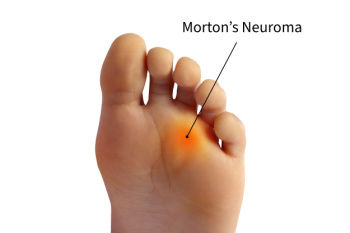
Clubfoot is a congenital condition in which a baby' s foot is twisted out of its normal position. The medical term, talipes, refers to this deformity, and one common form is talipes equinovarus, where the foot points downward and inward. In equinus, the foot is fixed in a downward position, while varus describes the inward turning of the heel. Causes may include genetic factors, abnormal fetal positioning, or neuromuscular conditions. Early diagnosis is essential to promote proper development and mobility. A podiatrist can evaluate the deformity, coordinate corrective treatment, and monitor progress throughout growth. If your child has been born with a clubfoot, it is strongly suggested that you include a podiatrist on your healthcare team to ensure healthy foot alignment and long-term function.
Congenital foot problems require immediate attention to avoid future complications. If you have any concerns, contact Lauryn Smith-Winton, DPM of S.W. Podiatry Group. Our doctor can provide the care you need to keep you pain-free and on your feet.
Congenital foot problems are deformities affecting the feet, toes, and/or ankles that children are born with. Some of these conditions have a genetic cause while others just happen. Some specific foot ailments that children may be born with include clubfeet, polydactyly/macrodactyly, and cleft foot. There are several other foot anomalies that can occur congenitally. What all of these conditions have in common is that a child may experience difficulty walking or performing everyday activities, as well as trouble finding footwear that fits their foot deformity. Some of these conditions are more serious than others. Consulting with a podiatrist as early as possible will help in properly diagnosing a child’s foot condition while getting the necessary treatment underway.
What are Causes of Congenital Foot Problem?
A congenital foot problem is one that happens to a child at birth. These conditions can be caused by a genetic predisposition, developmental or positional abnormalities during gestation, or with no known cause.
What are Symptoms of Congenital Foot Problems?
Symptoms vary by the congenital condition. Symptoms may consist of the following:
- Clubfoot, where tendons are shortened, bones are shaped differently, and the Achilles tendon is tight, causing the foot to point in and down. It is also possible for the soles of the feet to face each other.
- Polydactyly, which usually consists of a nubbin or small lump of tissue without a bone, a toe that is partially formed but has no joints, or an extra toe.
- Vertical talus, where the talus bone forms in the wrong position causing other bones in the foot to line up improperly, the front of the foot to point up, and the bottom of the foot to stiffen, with no arch, and to curve out.
- Tarsal coalition, when there is an abnormal connection of two or more bones in the foot leading to severe, rigid flatfoot.
- Cleft foot, where there are missing toes, a V-shaped cleft, and other anatomical differences.
- Macrodactyly, when the toes are abnormally large due to overgrowth of the underlying bone or soft tissue.
Treatment and Prevention
While there is nothing one can do to prevent congenital foot problems, raising awareness and receiving neonatal screenings are important. Early detection by taking your child to a podiatrist leads to the best outcome possible.
If you have any questions, please feel free to contact our office located in Waldorf, MD . We offer the newest diagnostic and treatment technologies for all your foot care needs.

Foot pain can often be managed with conservative care, but certain conditions may eventually require surgical treatment. Problems such as severe bunions, advanced arthritis, chronic tendon tears, and persistent nerve compression can cause ongoing pain and limit mobility, despite nonsurgical efforts. Recurrent ankle instability, fractures that do not heal properly, and deformities that interfere with walking may also lead to surgical discussion. In some cases, long-standing plantar fasciitis or painful hammertoes may warrant intervention when daily activities are consistently affected. Surgery is usually considered only after more conservative treatments like orthotics, targeted exercise, footwear changes, and activity modification have failed to provide relief. The goal is to reduce pain, restore function, and improve alignment so walking becomes more comfortable. Each condition requires careful evaluation to determine the most appropriate approach. When foot pain continues to interfere with daily life, it is suggested that you see a podiatrist for a proper diagnosis and treatment options, which may include foot surgery.
Foot surgery is sometimes necessary to treat a foot ailment. To learn more, contact Lauryn Smith-Winton, DPM of S.W. Podiatry Group. Our doctor will assist you with all of your foot and ankle needs.
When Is Surgery Necessary?
Foot and ankle surgery is generally reserved for cases in which less invasive, conservative procedures have failed to alleviate the problem. Some of the cases in which surgery may be necessary include:
- Removing foot deformities like bunions and bone spurs
- Severe arthritis that has caused bone issues
- Cosmetic reconstruction
What Types of Surgery Are There?
The type of surgery you receive will depend on the nature of the problem you have. Some of the possible surgeries include:
- Bunionectomy for painful bunions
- Surgical fusion for realignment of bones
- Neuropathy decompression surgery to treat nerve damage
Benefits of Surgery
Although surgery is usually a last resort, it can provide more complete pain relief compared to non-surgical methods and may allow you to finally resume full activity.
Surgical techniques have also become increasingly sophisticated. Techniques like endoscopic surgery allow for smaller incisions and faster recovery times.
If you have any questions, please feel free to contact our office located in Waldorf, MD . We offer the newest diagnostic and treatment technologies for all your foot care needs.

Morton’s neuroma is a painful condition that affects the nerves between the toes, most commonly between the third and fourth toes. It occurs when the nerve becomes thickened or compressed, often due to repetitive stress, wearing tight footwear, or abnormal foot mechanics. Symptoms typically include sharp or burning pain, tingling, numbness, and a feeling of something being stuck in the shoe. Risk factors include wearing high heels or narrow shoes, participating in high-impact activities, and having certain foot structures like flat feet or high arches. A podiatrist can evaluate the foot, provide orthotic support, recommend footwear modifications, and offer treatment to reduce pain and prevent progression. If you have pain in this part of your foot, it is suggested that you consult a podiatrist who can accurately diagnose and treat what may be going on.
Morton’s neuroma is a very uncomfortable condition to live with. If you think you have Morton’s neuroma, contact Lauryn Smith-Winton, DPM of S.W. Podiatry Group. Our doctor will attend to all of your foot care needs and answer any of your related questions.
Morton’s Neuroma
Morton's neuroma is a painful foot condition that commonly affects the areas between the second and third or third and fourth toe, although other areas of the foot are also susceptible. Morton’s neuroma is caused by an inflamed nerve in the foot that is being squeezed and aggravated by surrounding bones.
What Increases the Chances of Having Morton’s Neuroma?
- Ill-fitting high heels or shoes that add pressure to the toe or foot
- Jogging, running or any sport that involves constant impact to the foot
- Flat feet, bunions, and any other foot deformities
Morton’s neuroma is a very treatable condition. Orthotics and shoe inserts can often be used to alleviate the pain on the forefront of the feet. In more severe cases, corticosteroids can also be prescribed. In order to figure out the best treatment for your neuroma, it’s recommended to seek the care of a podiatrist who can diagnose your condition and provide different treatment options.
If you have any questions, please feel free to contact our office located in Waldorf, MD . We offer the newest diagnostic and treatment technologies for all your foot care needs.

